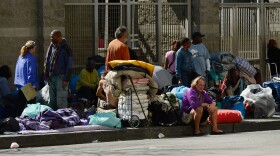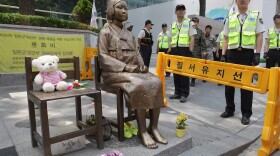
Aaron Schrank
Phone: 307-766-5064
Email: aschran1@uwyo.edu
Before joining WPR, Aaron worked as a freelance reporter in Los Angeles, where he earned a master’s degree in audio journalism from the University of Southern California. His radio work has aired on programs including NPR’s Morning Edition and All Things Considered, American Public Media’s Marketplace and Public Radio International’s The World. Aaron has roots in Phoenix, Arizona, Southern Illinois and New Jersey. When not reporting, he spends time hiking, camping, traveling and exploring film, music and food.
-
There are huge gaps in school funding between affluent and property-poor districts. And, with evidence that money matters, especially for disadvantaged kids, something has to change.
-
One in three Native students are what's considered "chronically absent," in this state. Educators on the Wind River Indian Reservation say that's a major factor holding back student achievement.
-
So far, 13 states have adopted the Next Generation Science Standards, but elsewhere these standards are causing controversy because of what they say about climate change. In Wyoming, reports Aaron Schrank, it's a particularly touchy issue.
-
Opponents of a new California law that aims to accommodate transgender students say they've gathered enough signatures to try to overturn it on next year's ballot. The law allows transgender students to use the bathrooms and join the sports teams that match their gender identity.
-
Homeless-services providers in Los Angeles County are gathering data on the homeless population and ranking people by vulnerability. The goal is to get the most in need into permanent housing quickly. The "housing first" approach has been used in cities nationwide, but it has its critics, even among other advocates.
-
A sculpture memorializing the East Asian women forced to provide sex to Japanese soldiers during World War II is causing a stir in Glendale, Calif. An identical statue in Seoul has become a focal point of tension among former "comfort women" and some Japanese who say the women's stories are untrue.




